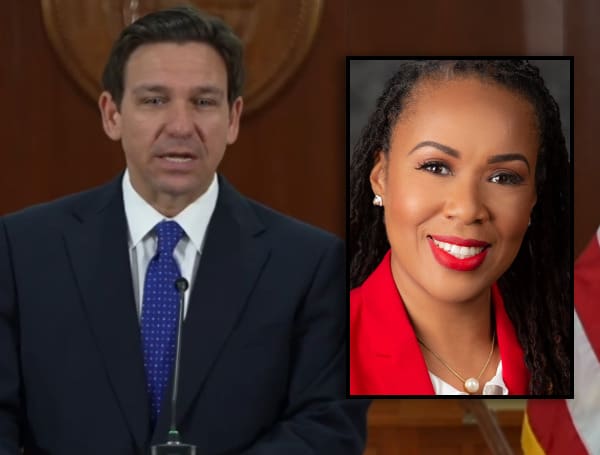
The Florida Supreme Court on Thursday upheld Gov. Ron DeSantis’ decision to suspend Orlando-area State Attorney Monique Worrell, saying he made adequate allegations of neglect of duty and incompetence.
DeSantis issued an executive order in August that suspended Worrell, a Democrat who was elected in 2020 in the 9th Judicial Circuit, which is made up of Orange and Osceola counties. The move drew widespread attention and came after DeSantis also suspended Hillsborough County State Attorney Andrew Warren, a twice-elected Democrat.
In the Worrell executive order, DeSantis made a series of allegations, such as that the prosecutor’s policies prevented or discouraged assistant state attorneys from seeking minimum mandatory sentences for gun crimes and drug trafficking offenses. As another example, the executive order alleged Worrell’s policies prevented assistant state attorneys from seeking “sentencing enhancements” for certain defendants.
Read: Backers Of Florida Constitutional Amendment For Hunting, Fishing Top $450,000
Worrell filed a challenge at the Supreme Court in September, arguing DeSantis did not have a legal basis for the suspension. But justices, in a 6-1 decision Thursday, backed DeSantis.
“(We) have said that a suspension order does not infringe on a state attorney’s lawful exercise of prosecutorial discretion where it alleges that such discretion is, in fact, not being exercised in individual cases but, rather, that generalized policies have resulted in categorical enforcement practices,” Thursday’s main opinion said, citing a 2017 precedent. “While broad in its lawful scope, prosecutorial discretion is no complete defense to an allegation of incompetence or dereliction of duty.”
Chief Justice Carlos Muniz and Justices Charles Canady, John Couriel, Jamie Grosshans and Meredith Sasso shared the main opinion, while Justice Renatha Francis wrote a concurring opinion. All but Canady were appointed to the Supreme Court by DeSantis.
Justice Jorge Labarga dissented, pointing to decisions that state attorneys routinely make about issues such as whether adequate proof exists to pursue charges against defendants. He wrote that “it is difficult to grasp how Worrell, given the specific challenges and circumstances posed by her diverse circuit in dealing with specific cases, will be able to mount a meaningful defense to allegations of ‘incompetence’ and ‘neglect of duty’ — for basically engaging in similar practices, even if with greater frequency, as other state attorneys throughout our state.”
Read: Florida Gov. DeSantis Signs “Cassi Carli Law”
“If this (Supreme) Court permits Worrell’s suspension to stand based on the allegations set forth in the executive order, any time a state attorney’s office in Florida engages in similar case dispositions with some regularity because the specific challenges of the moment in the circuit require it, that state attorney may also face suspension and replacement despite having been overwhelmingly elected by the voters of the circuit,” wrote Labarga, who along with Canady, was appointed by former Gov. Charlie Crist.
But the court majority pushed back against Labarga’s reference to Worrell being “overwhelmingly elected.”
“The dissent seems surprised that a ‘state attorney may . . . face suspension and replacement despite having been overwhelmingly elected by the voters of the circuit.’ An elected official’s margin of victory is of no constitutional relevance to the governor’s suspension power,” a footnote in the main opinion said.
While DeSantis suspended Worrell, the Florida Senate would have ultimate authority to decide whether to remove her from office. The Senate has not taken action as the Supreme Court case was pending.
DeSantis appointed Andrew Bain, who had served as an Orange County judge, to replace Worrell. But Worrell has qualified to run in the November election to try to win back the job. Bain also has qualified to run as a candidate without party affiliation.
In a petition filed at the Supreme Court in September, Worrell’s attorneys pointed to “prosecutorial discretion” in arguing that DeSantis didn’t have a basis for the suspension.
“Ms. Worrell was elected to serve as state attorney, not the governor,” the petition said. “Mere disagreement between a governor and a state attorney about where within the lawful range of discretion that discretion should be exercised falls far short of the constitutionally required showing of neglect of duty or incompetence.”
But in a response filed in October, lawyers for DeSantis disputed Worrell’s arguments about prosecutorial discretion,
“Ms. Worrell does not have ‘discretion’ to abuse her power to bring criminal charges by chronic underenforcement of Florida law,” the response said.
Two voters and the group Florida Rising Together also filed a federal lawsuit challenging Worrell’s suspension. But U.S. District Judge Julie Sneed issued a 15-page ruling last month that said the plaintiffs did not have legal standing to pursue the lawsuit.
The state Supreme Court last year also rejected a challenge by Warren to his suspension, saying he waited too long to bring the case.
In a separate federal-court case, U.S. District Judge Robert Hinkle last year let the Warren suspension stand. But a panel of the 11th U.S. Circuit Court of Appeals in January said the suspension violated First Amendment protections and ordered Hinkle to look again at the case. The state has asked the full Atlanta-based appeals court to take up the dispute.
Help support the Tampa Free Press by making any small donation by clicking here.
Android Users, Click To Download The Tampa Free Press App And Never Miss A Story. Follow Us On Facebook and Twitter. Sign up for our free newsletter.
